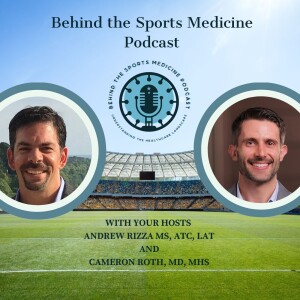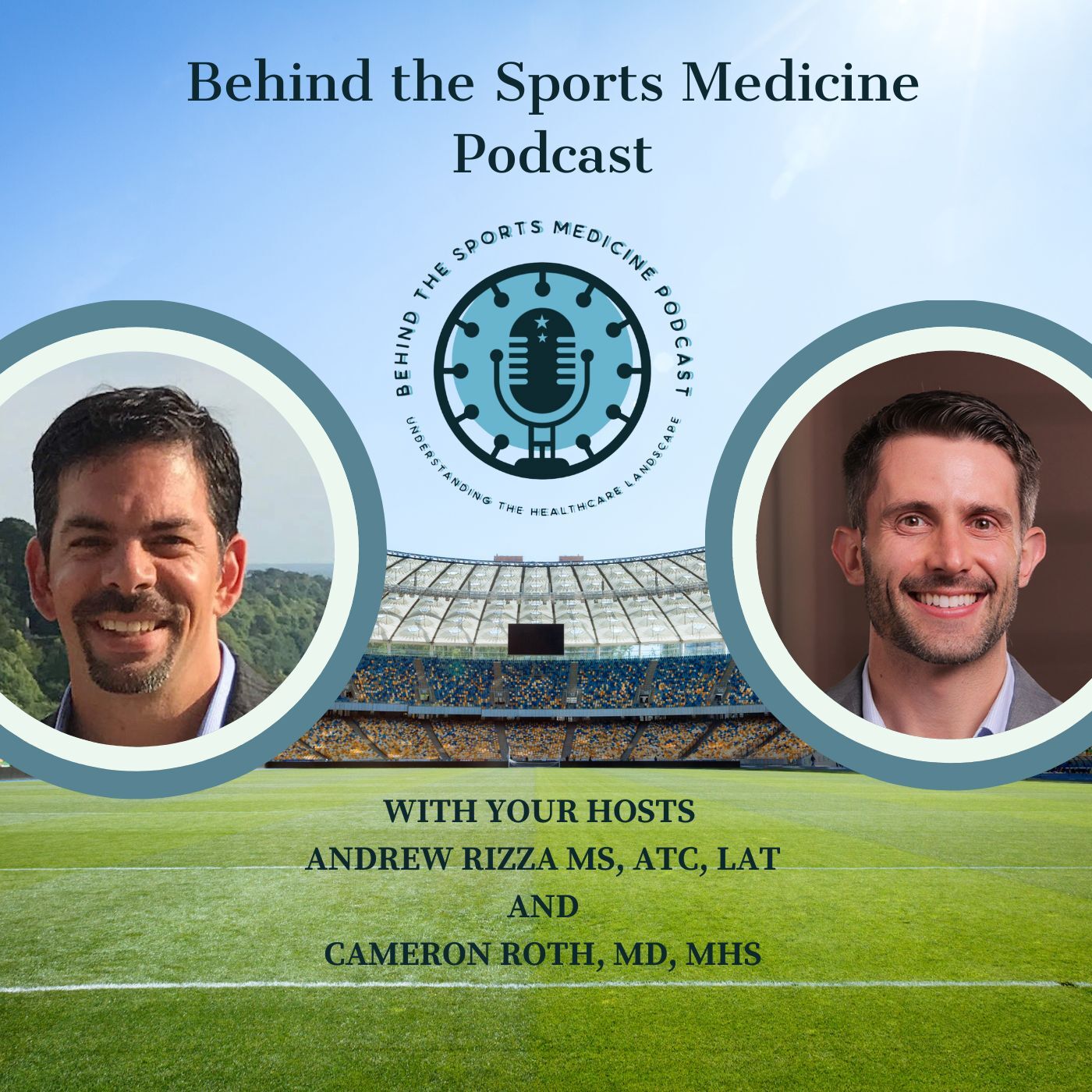
Andrew Rizza, MS, ATC, LAT, PTA
Creator and Host
Behind the Sports Medicine Podcast was created to discuss the ever-changing landscape in healthcare, physical therapy, athletic training and sports science. Each week we will discuss the barriers that healthcare professionals and the consumer face and how we as individuals can collaborate to make the listeners better understand the industry for a better patient and athlete experience.

Cameron Roth, MD, MHS
Co- Host
Hand & Upper Extremity Surgeon
OrthoArizona
Dr Roth is a fellowship-trained orthopedic surgeon specializing in hand, wrist, and upper extremity surgery. He completed his Orthopaedic surgical residency at the University of Chicago, as well as additional fellowship subspeciality training in upper extremity surgery at Harvard and an international fellowship in complex shoulder reconstruction in Bern, Switzerland. He is a peer-reviewer for The Journal of Hand Surgery and also serves as a consultant to the MLB’s Chicago White Sox.
Episodes

Monday May 12, 2025
Monday May 12, 2025
In this episode, hosts Andrew Rizza MS, ATC, LAT and Dr. Cameron Roth MD, MHS sit down with Brian Patrone, PA-C of Boston Orthopedics and Wellness to dive into the latest innovations in regenerative medicine. Together, they explore the real-world applications of PRP (Platelet-Rich Plasma) injections, peptide therapies like BPC-157 and TB-500, and the emerging use of NAD+ and stem cells in sports injury recovery.
Love our content? Show your support by liking, commenting, and sharing! Listen on Apple Podcasts, Spotify, or your preferred platform. Stay connected on Instagram @behind_sports_med_podcast, X @ajrsportssci, or visit ajrsportsscience.podbean.com. Don’t forget to subscribe to our YouTube channel @ajr_sports_science. Thank you for your continued support! #AOSSM #NATA #APTA #ATIPT # Orthoarizona #bostonorthopedicsandwellness

Monday May 05, 2025
Monday May 05, 2025
In this episode of Behind the Sports Medicine, Dr. Kai Mithoefer joins host Andrew Rizza to explore the multifaceted world of work-related injuries. Framing injured workers as "industrial athletes," Dr. Mithoefer discusses the psychological and physical components of recovery, the importance of individualized rehab, and the critical role of communication among all stakeholders in patient care.
You’ll also hear about Dr. Mithoefer’s personal journey into orthopedics, his philosophy on building trust with patients, and how a supportive environment can empower recovery and return-to-work success.
Love our content? Show your support by liking, commenting, and sharing! Listen on Apple Podcasts, Spotify, or your preferred platform. Stay connected on Instagram @behind_sports_med_podcast, X @ajrsportssci, or visit ajrsportsscience.podbean.com. Don’t forget to subscribe to our YouTube channel @ajr_sports_science. Thank you for your continued support! #NATA #orhtoarizona #aossm #apta #sportsmedicine #aaos #AOFAS #BBJI #ATIPT
🎧 Tune in on your favorite podcast platform!

Monday Apr 28, 2025
Monday Apr 28, 2025
Dr. Mike Perrone LA Orthopedic Surgery Specialists joins Dr. Cameron Roth and Andrew Rizza of Behind the Sports Medicine Podcast to break down common foot and ankle injuries, from ankle sprains to Achilles tendon issues. He shares insights on assessment, treatment options—both surgical and non-surgical—and the importance of mental readiness in recovery. Plus, tips on preventing injuries through proper footwear and early intervention.
Love our content? Show your support by liking, commenting, and sharing! Listen on Apple Podcasts, Spotify, or your preferred platform. Stay connected on Instagram @behind_sports_med_podcast, X @ajrsportssci, or visit ajrsportsscience.podbean.com. Don’t forget to subscribe to our YouTube channel @ajr_sports_science. Thank you for your continued support! #NATA #orhtoarizona #aossm #apta #sportsmedicine #aaos #AOFAS #laorthos

Monday Apr 21, 2025
Monday Apr 21, 2025
🎙️ Episode 30: Pioneering Performance – A Conversation with Sports Scientist Michael Cianciosi
In this episode of Behind the Sports Medicine Podcast, host Andrew Rizza sits down with Michael Cianciosi, a seasoned sports scientist whose career spans both Australia and the United States. Michael shares his journey through prominent roles with the Carlton Football Club, Catapult Sports, Boston Red Sox, and most recently with Manager, Athlete Management System (Acting) Australian Institute of Sport (AIS)offering a unique perspective on the global evolution of sports science.
Whether you're an athlete, coach, or sports science enthusiast, this episode is packed with practical insights and forward-thinking strategies for performance optimization in today's high-tech world.
Love our content? Show your support by liking, commenting, and sharing! Listen on Apple Podcasts, Spotify, or your preferred platform. Stay connected on Instagram @behind_sports_med_podcast, X @ajrsportssci, or visit ajrsportsscience.podbean.com. Don’t forget to subscribe to our YouTube channel @ajr_sports_science. Thank you for your continued support! #NATA #BostonRedsox, #catapultsports, #CarltonFBclub #sportsscience #australianInstituteofsport

Monday Apr 14, 2025
Monday Apr 14, 2025
Ep. 29 of Behind the Sports Medicine features Dr. J.P. Warner of Mass General discussing the evolution of rotator cuff repairs, failed surgeries, non-op treatments, the Latarjet procedure, reverse shoulder arthroplasty, and more.
Athletes, surgeons, and sports med pros—don’t miss this deep dive into shoulder surgery! 💪🩺
Love our content? Show your support by liking, commenting, and sharing! Listen on Apple Podcasts, Spotify, or your preferred platform. Stay connected on Instagram @behind_sports_med_podcast, X @ajrsportssci, or visit ajrsportsscience.podbean.com. Don’t forget to subscribe to our YouTube channel @ajr_sports_science. #NATA, #APTA, #ATIPT, #athletictraining #sportsscience #orthopedics #atofmass #OrhtoArizona #Massgeneralshoulderservice #SportsMedicine #ShoulderSurgery #OrthopedicsPodcast #aossm #ajsm

Monday Apr 07, 2025
Monday Apr 07, 2025
The SAFE ACT (House Bill 1171)"Importance of addressing addiction and falls in the elderly population" Tune into Episode 28 with Nikesh Patel PT, DPT, Executive Director of Alliance for Physical Therapy Quality and Innovation (APTQI). In this episode, Dr. Nick Patel discusses his journey in physical therapy and advocacy, focusing on the importance of addressing fall risks in the elderly population. He explains the SAFE Act, which aims to incorporate fall risk assessments into annual wellness visits for Medicare beneficiaries, promoting preventative care. The conversation highlights the need for better awareness of physical therapy's role in reducing healthcare costs and improving patient independence, as well as the future directions for advocacy within the profession. In this conversation, Nick and Andrew discuss the challenges faced by outpatient therapy providers, particularly in relation to Medicare payment models and outdated CPT codes. They emphasize the need for reform in the healthcare system to better support low-cost providers who deliver quality care. The discussion highlights the importance of collaboration among competitors in the healthcare industry and the role of therapists in advocating for change. They also explore the future of physical therapy, focusing on the need for therapists to claim their space in managing musculoskeletal disorders and demonstrating their cost-effectiveness to ensure sustainability in the industry.
If you find our content engaging, please show your support by liking, commenting, and sharing it on social media. Access all our episodes on Apple Podcasts, Spotify, or your preferred podcast platform. Stay updated by following us on Instagram @behind_sports_med_podcast, on X @ajrsportssci, or by visiting our websites at https://lnkd.in/e_pGn4f8 and AJRsportsscience.com. Don't forget to subscribe to our YouTube channel @ajr_sports_science for upcoming episodes. Thank you for your continued support, and stay tuned for our next episode. #SAFEACT #NATA, #APTA, #ATIPT, #athletictraining #sportsscience #orthopedics #atofmass #APTQI Cameron Roth OrthoArizona

Monday Mar 31, 2025
Monday Mar 31, 2025
"Athletic Trainers Advocating for Better Pay, Better Jobs and Professional Recognition" Episode 27 with Stephen Panteleakos, MS, LAT, ATC, a seasoned athletic trainer and the visionary behind Modern Movement Solutions. Their conversation delves into various aspects of the athletic training profession, providing listeners with a comprehensive view of its current state and future prospects.
The episode explores the evolving landscape of athletic training, highlighting both the opportunities and challenges that professionals in the field face. Steve and Andrew discuss the importance of staying ahead of industry trends and the role of continuing education in ensuring that athletic trainers remain competitive and effective in their roles.
If you find our content engaging, please show your support by liking, commenting, and sharing it on social media. Access all our episodes on Apple Podcasts, Spotify, or your preferred podcast platform. Stay updated by following us on Instagram @behind_sports_med_podcast, on X @ajrsportssci, or by visiting our websites at ajrsportsscience.podbean.com and AJRsportsscience.com. Don't forget to subscribe to our YouTube channel @ajr_sports_science for upcoming episodes. Thank you for your continued support, and stay tuned for our next episode. #NATA, #APTA, #ATIPT, #athletictraining #sportsscience #orthopedics #atofmass #NWATA #Athletictrainingmonth

Monday Mar 24, 2025
Monday Mar 24, 2025
"The Future of Athletic Training" Tune into Episode 26 of The Behind the Sports Medicine Podcast on March 24th with Matthew Smitley an athletic trainer and assistant professor at the University of Kentucky. They discuss the evolving landscape of athletic training, including the future of education, the importance of quality clinical experiences, the challenges of job vacancies, and the need for athletic trainers to effectively communicate their value to secure better compensation. The conversation highlights the significance of innovation and advocacy in the profession. In this conversation, Matthew Smitley and Andrew Rizza discuss the evolving role of athletic trainers, emphasizing the importance of recognition, dual credentialing, and advocacy within the profession. They explore the challenges faced by entry-level practitioners, the significance of effective communication in defining the role of athletic trainers, and the ongoing debate surrounding advanced degrees in athletic training. The discussion highlights the need for continuous education and the potential for athletic trainers to become key players in the healthcare system.
If you find our content engaging, please show your support by liking, commenting, and sharing it on social media. Access all our episodes on Apple Podcasts, Spotify, or your preferred podcast platform. Stay updated by following us on Instagram @behind_sports_med_podcast, X @ajrsportssci, or by visiting our websites at https://lnkd.in/e_pGn4f8 and AJRsportsscience.com. Don't forget to subscribe to our YouTube channel @ajr_sports_science for upcoming episodes. Thank you for your continued support, and stay tuned for our next episode. #NATA, #APTA, #ATIPT, #athletictraining #sportsscience #orthopedics #atom #universityofkentucky #universityofkentuckywildcats #universityofkentuckyathletics

